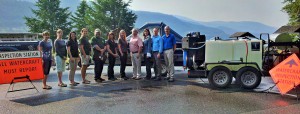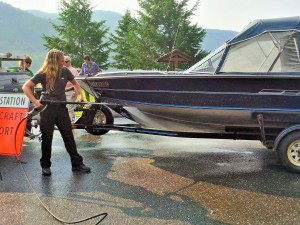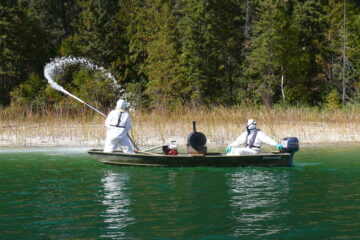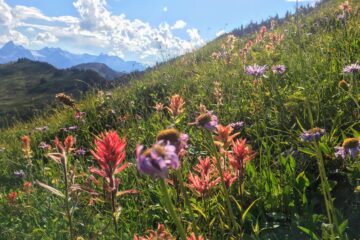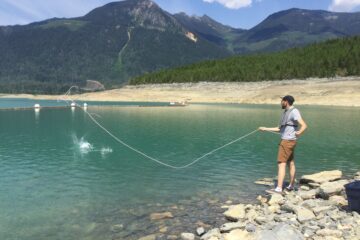B.C. GETS BOOST IN FIGHT AGAINST INVASIVE MUSSELS
VICTORIA – Columbia Basin Trust is helping the province to double the number of mobile decontamination units aimed at stopping invasive mussels from entering British Columbia waterways, thanks to $360,000 in new funding.
This new partnership, in the Ministry of Environment led Invasive Mussel Defence Program, also includes support from Columbia Power Corporation, FortisBC and the four local invasive species councils operating in the region East Kootenay Invasive Plant Council, Central Kootenay Invasive Species Society, Columbia Shuswap Invasive Species Society and the Northwest Invasive Plant Council.
The new resources mean an additional three mobile inspection and decontamination crews will be dedicated to stopping and ensuring boats are free of mussels. The teams will be based in Cranbrook, Valemount and Nelson, to target major entry points from Alberta and the U.S. The new teams join three other crews that are already operational, doubling the number of mobile units dedicated to protecting B.C.s lakes and rivers against the threat of quagga and zebra mussels.
The decontamination units allow auxiliary conservation officers, who are trained to identify mussel-infested boats, to decontaminate boats and trailers entering B.C. The teams also respond to boats identified as concerns by the Canada Border Services Agency, and partner agencies in Alberta and the U.S. The mobile units move between border locations, focusing on high-traffic routes and have the ability to quickly respond to any reports of potential threats called in through the provincial Report All Poachers and Polluters line.
The addition of these specialized mussel detection teams further enhances the provincial early detection and rapid response program for invasive mussels. This includes supporting education and outreach activities, such as the Clean, Drain, Dry program being delivered by the invasive species councils.
Aquatic invasive species, such as zebra and quagga mussels, pose a significant threat to Canada’s freshwater ecosystems and critical infrastructure such as hydroelectric and drinking water facilities. No zebra or quagga mussels have ever been found in B.C. waterways, and the Province is hard at work ensuring it stays that way.
Quotes:
Mary Polak, Minister of Environment
“Columbia Basin Trust, Columbia Power Corporation and FortisBC recognize the importance of Ministry of Environment Columbia Basin Trust protecting aquatic infrastructure and environments in B.C. from invasive mussels. Thanks to their generosity, we are doubling the number of mobile decontamination units aimed at ensuring these invasive species never enter our waterways. This is another step forward in our ongoing efforts against invasive mussels.”
Bill Bennett, East Kootenay MLA
“Invasive mussels pose a threat to more than just ecosystems, but to drinking water facilities, hydro stations, agricultural irrigation and more. This funding boost from Columbia Basin Trust, Columbia Power Corporation and FortisBC allows the Province to further strengthen efforts to stop zebra and quagga mussels from entering B.C.”
Neil Muth, president and CEO, Columbia Basin Trust
“Preventing the threat of invasive mussels is critical to protecting our waterways for environmental, economic and recreational reasons, and has been identified as a priority by the residents that live here. Increasing the level of protection in this region is key and we are pleased to support the prevention efforts this summer to keep mussels out of the Columbia Basin.”
Sue Dyer, vice president, Operations, Columbia Power Corporation
“Protecting aquatic infrastructure and the environment is important to Columbia Power. We are pleased to be working in partnership with the Ministry of Environment and Columbia Basin Trust to generate awareness of invasive mussels and create new decontamination sites.”
Jody Drope, vice president, HR & Environment, Health & Safety, FortisBC
“FortisBC operates in an environmentally responsible manner to protect the environment for future generations. Preventing the spread of invasive mussels is an important task facing the province today. These mussels grow at a rapid rate, killing off native aquatic life and posing a threat to our hydroelectric dams. We are committed to working on a solution to stem the mussels spread while ensuring the protection of our freshwater ecosystem.”
Khaylish Fraser, aquatic invasive species program coordinator, Central Kootenay Invasive
Species Society
“Preventing the introduction of zebra and quagga mussels is key because it only takes one boat with live mussels or their larvae to enter a waterway in B.C. to be catastrophic. This is why it’s so important that this defence program continue beyond this summer and that it continues to expand here in the Columbia Basin and throughout the province.”
Quick Facts:
Zebra mussels (Dreissena polymorpha) and quagga mussels (Dreissena rostriformis
bugensis) are not native to B.C.
- · Both of these species originate from Europe. They were introduced to Canada (in the Great Lakes region) and the United States in the 1980s, as the result of ballast water being discharged by vessels travelling from Europe.
- · They are propeller blade shaped freshwater mussels that can easily attach themselves to objects and other organisms, and they are difficult to remove.
- · Adult mussels will attach themselves to boat hulls, trailers, motors, vegetation and equipment.
- · Where introduced, these mussels kill native mussels and clams, and reduce native fish species, by altering the aquatic food web. They also attach to aquatic plants and submerged surfaces, including piers, pilings, water intakes and fish screens.
- · If large numbers of mussels become established in an area, they can cover hard surfaces and clog pipes.
- · To report suspected invasive mussels, please call the Report All Poachers and Polluters line (RAPP), at 1 877 952-7277.
- · Funding for this initiative is provided as follows:
o Columbia Basin Trust $275,000
o Columbia Power Corporation $70,000
o FortisBC $15,000
- · Columbia Basin Trust entered into a three year partnership with the four invasive species councils (councils) in the Basin last year. The councils have recently completed the development of a co-ordinated Basin-wide strategy for addressing priority aquatic invasive species, including mussels.
- · The councils will provide their valuable time and equipment toward this initiative.
- · Columbia Basin Trust supports the ideas and efforts of the people in the Columbia Basin. The Trust offers a range of services, programs, initiatives and financial investments for the social, economic and environmental well-being of the Columbia Basin now and for generations to come.
- · Columbia Power develops, owns and operates hydro power projects in the Columbia Basin.
- · FortisBC is a regulated utility focused on providing safe and reliable energy, including natural gas, electricity and propane. FortisBC employs more than 2,200 British Columbians and serves approximately 1.1 million customers in 135 B.C. communities.
Learn More:
Find out more about invasive zebra and quagga mussels:
https://news.gov.bc.ca/
To find out more about what the public can do to help keep B.C. invasive-mussel free, visit:
https://www.for.gov.bc.ca/hra/
To learn more about Columbia Basin Trust, visit: http://www.cbt.org/.
For more information about Columbia Power, visit: www.columbiapower.org.
For more information about FortisBC, visit: www.fortisbc.com.
